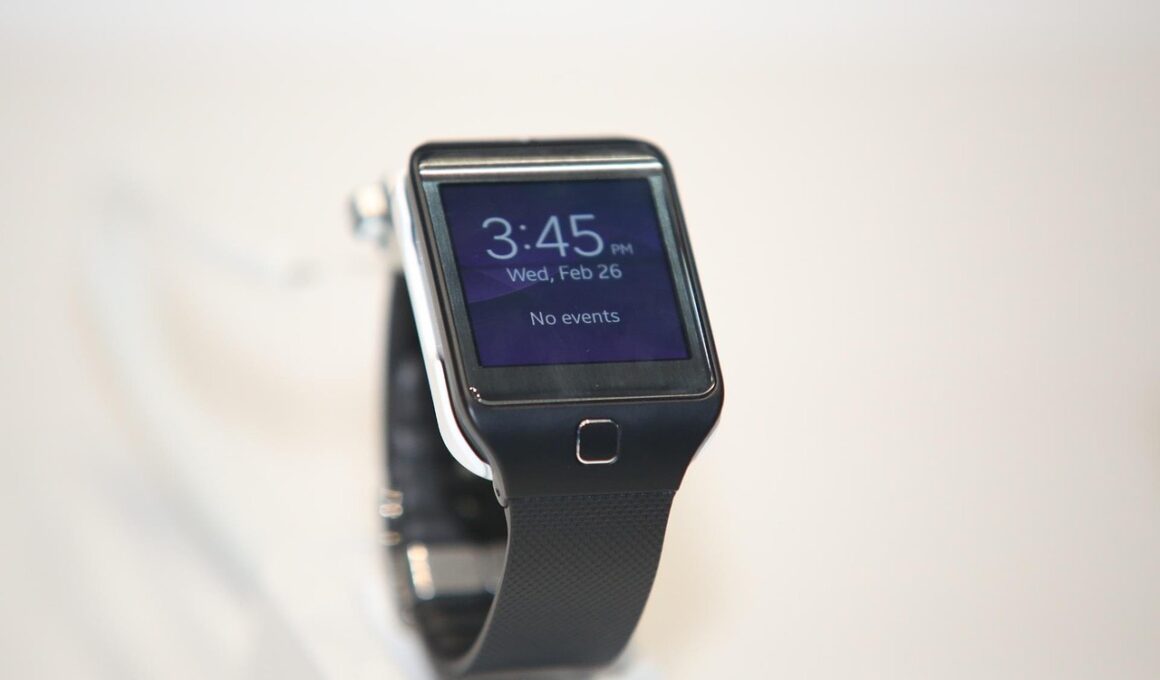Wearables and Nutrition: Combining Coaching for Fitness and Diet
In the evolving landscape of fitness, wearables have emerged as pivotal tools, merging technology with health. These devices, equipped with sensors and algorithms, track various metrics, from heart rate to calories burned. By collecting real-time data, users gain insights into their health and fitness progression. An essential advantage of wearables comes into play when personalized coaching is implemented. This integration not only helps individuals track their physical activity but also aligns it with nutrition, which is crucial for overall well-being. For effective results, it is essential that these wearable devices prompt users to engage with their nutritional habits. Many wearable technologies now synchronize with meal planning apps, offering tailored dietary suggestions based on physical activity levels. Combining these aspects leads to a comprehensive approach, allowing individuals to understand how their diet influences their fitness and vice versa. Furthermore, this synergy opens up opportunities for real-time alterations in dietary recommendations based on daily physical activities. Embracing this technology can significantly enhance one’s health journey while providing motivation and accountability.
One of the standout features of wearables is their ability to provide real-time feedback on both fitness and dietary inputs. Users can receive notifications about their calorie intake and activity levels seamlessly throughout the day. This constant engagement keeps individuals aware of their habits, encouraging them to stay focused on their health goals. Many wearables offer interactive coaching programs that adjust as users progress, ensuring that both their fitness regimen and nutritional plans evolve accordingly. For instance, if a user is not meeting their step goals, the device might suggest dietary adjustments to enhance performance. Additionally, the specificity of enriched health insights enhances the personalization of coaching. The future of health tech relies heavily on blending data from food intake and physical performance, thereby promoting a holistic view of health. Wearable technology is now more integrated with social networks, creating communities that share successes and challenges. Engaging with a group enhances accountability, making the journey toward fitness and improved diet a collaborative effort. This community aspect can lead to positive reinforcement, motivating users to stick with their programs.
The Role of App Integration for Nutrition
For wearables to deliver maximum benefits, they often come equipped with mobile applications designed to track food intake intelligently. These apps usually allow users to log meals and snacks effortlessly, estimating nutritional values based on entered data. By integrating user profiles with fitness regimes, these applications can provide timely meal suggestions tailored to personal goals. For example, if an individual exercises more vigorously, the app may suggest higher protein or carb intake to enhance recovery. This capability fosters a greater understanding of how nutrition plays a role in fitness achievements. Moreover, as users log their food consumption, algorithms analyze trends and offer feedback to refine dietary choices. Such insights empower users to make informed decisions, which can drastically alter their weight loss or fitness journey positively. Enhanced user experience is crucial, as individuals tend to engage more with an accessible and user-friendly interface. Consequently, the more straightforward and intuitive these applications are, the more likely users will consistently use their wearables and adhere to personalized coaching recommendations over time.
Implementing wearables alongside personalized nutrition coaching can lead to significant improvements in health metrics. Data-driven insights enable users to recognize patterns in their behaviors relating to diet and exercise, facilitating informed decision-making. Over time, this practice can cultivate healthier habits and promote sustainable lifestyle changes. Coaches can analyze a user’s metrics and craft motivated nutritional plans that align seamlessly with their fitness progress. Furthermore, real-time adaptations to nutritional intake can help users maintain energy levels, especially during rigorous training sessions. Testing and adjustments based on immediate feedback are vital for optimizing physical performance and achieving fitness goals. By leveraging both wearables and nutrition-focused coaching, individuals can create a balanced approach towards healthy living, leading to long-term benefits. It also encourages accountability whereby the user feels responsible for their progress. Social features embedded in devices and applications foster communication between users and coaches, enhancing support systems. When individuals are connected to others on similar journeys, they often feel motivated to push through challenges, making the combination of wearables and nutrition coaching a game changer in achieving fitness goals.
Future Trends in Fitness Technologies
As the demand for fitness technology continues to rise, we anticipate significant advancements in wearables that enhance personalized coaching experiences. Future technologies will likely incorporate artificial intelligence and machine learning to customize recommendations even further. This level of personalization can better guide users through their fitness journeys while adapting seamlessly to lifestyle changes. Additionally, biometric capabilities will likely evolve to monitor more health aspects such as hydration levels, sleep quality, and stress markers. Such innovations can provide a comprehensive view of users’ health, enabling them to understand the intricate connections between various factors influencing their fitness. Furthermore, integrating augmented reality into wearables may lead to interactive coaching experiences, where users engage in guided workouts and meal planning sessions. The accessibility of data will enhance user engagement, and as technology advances, it could pave the way for smart clothing that monitors body metrics directly. As innovation continues, fitness tracking will become more streamlined, merging seamlessly into daily lives without disruption while achieving health optimization efficiently.
The synergy between wearables and nutrition coaching is what makes this technology truly transformative. Users are equipped with the tools necessary not just to monitor, but to understand the repercussions of their choices in real-time. Personalized coaching, propelled by accurate data, provides clarity and tactical advice that users can tangibly implement. As technology becomes more user-centric, its ability to cater to individual preferences will improve, leading to higher rates of user satisfaction and engagement. For many, it means they can truly access a level of support that feels personal and in tune with their specific needs. Additionally, data sharing capabilities between devices and platforms will enable seamless integration and offer a multifaceted view of each user’s health journey. This holistic perspective will establish a more realistic outlook on progress, setting users up for sustained success. Whether it be through meal prep suggestions or optimized workout recommendations, the combination of wearables and nutrition coaching creates an all-encompassing environment. Ultimately, this approach leads to a brighter perspective on health and wellness.
Conclusion: Embracing Holistic Health Solutions
In conclusion, the junction of wearables and personalized nutrition coaching signifies a revolutionary approach to health and fitness. While exercise remains a crucial part of health maintenance, understanding the role of nutrition in achieving optimal fitness is equally vital. Wearable technology offers insights that can make a significant difference in individual precursors. Users who actively engage with both their fitness data and nutrition advice create a feedback loop that cultivates better lifestyle choices. By embracing this holistic view of health, individuals are empowered to take charge of their well-being in a data-informed way. As progress continues in fitness technology, it signifies how vital personalized coaching can be for reaching fitness goals. Whether you’re a beginner or a seasoned fitness enthusiast, merging wearables with nutrition coaching creates a foundation for comprehensive health awareness and proactive lifestyle management. The solution lies in understanding that both fitness and nutrition are interconnected, underscoring the notion that personal well-being is not merely a destination but an ongoing journey worth investing in every day.


